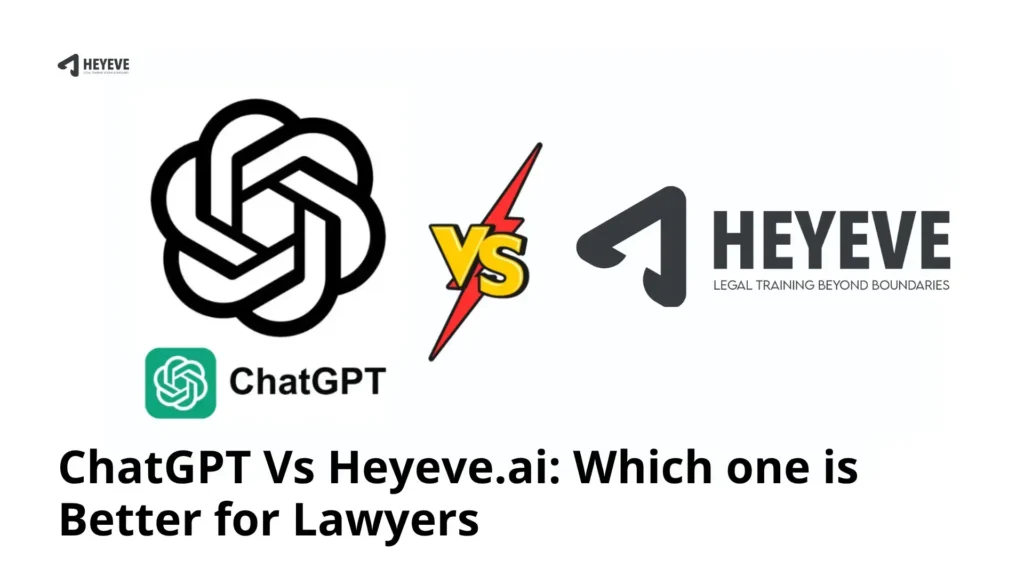“Your AI can tell jokes, but can it interpret a contract?”
That’s because in the legal world, being smart isn’t good enough- such words do not count.
AI is taken into everything. AI writes emails, creates summaries of cases that have been heard in some court, and generates even legal checklists. Even then, in 2025, over 35 percent of law firms will have had AI integrated into their regular workflow (Statista).
But most of those tools were not designed for lawyers.
They included no training on actual statutes and swathes of legal logic and reality in a courtroom. Brilliant, yes, but not law-smart.
So, what happens when you leave your legal work to a general AI?
- Citing non-existent cases (yes, it has happened before).
- There’s a possibility of breaching ethical standards.
- You end up wasting a lot of time, even worse, your reputation.
That’s why the ChatGPT vs. HeyEve.ai decision doesn’t just connect to features, but to the safeguarding of your business.
Every attorney looking for a proper AI assistant should read through this post to understand the real difference to ascertain that the wrong choice might cost more than just billable hours.
What is ChatGPT?
OpenAI is the creator of the general AI chatbot called ChatGPT. This means it can do the work of a digital assistant that is able to handle reading, writing, and talking. You can have it provide answers, manage your writing, review legal papers, and help you create fresh content ideas.
Lawyers use ChatGPT for:
- Turn tricky legal terms into language everyone will understand.
- Come up with blueprints for memos or contracts.
- Read short summaries of in-depth case files.
The problem with that is
The training for ChatGPT doesn’t prioritize the field of law. Being an AI program, it is unaware of legal details, cannot advise about real cases, and on purpose or not, may sometimes falsify facts or scenarios (AI pros refer to this as ‘hallucination’).
Still, even though it’s great for getting help quickly, you should always check its guesses, and this is most important for legal information.
What is Heyeve.ai?
HeyEve.ai has been designed especially for lawyers. Differently from ChatGPT, it’s based on legal data, real legal thinking, and situations from the courtroom.
Think about Heyeve.ai as an expert legal advisor you consult just as you would an intern.
Law firms rely on Heyeve.ai to help them.
- Start getting used to the idea of asking and answering questions in court.
- Look over and check the documents on the case.
- Set up answers to common client legal questions.
- Create your content by applying legal thinking.
It knows how laws are applied in real-life situations.
No guesswork. All cases happened. This is just one more way we keep your legal needs safe and on track.
Researchers refer to ChatGPT as an imagination-fueled creative aid. But if you need an AI partner for a courtroom, HeyEve is who you are looking for.
ChatGPT vs Heyeve.ai: Key Feature Comparison
AI in law is not all the same in its effectiveness, which depends on the tool used.
We will contrast ChatGPT and HeyEve.ai so you can understand exactly their roles in your legal practice.
| Features | Chatgpt | Heyeve.ai |
| Legal-Specific Training | No training on the content about the law | The tool relies on law-themed datasets for its training. |
| Mock Trial Preparation | No courtroom features | Features trial and interview trainers. |
| Compliance Awareness | Doesn’t follow legal standards | All features are in place to ensure compliance with ethical/legal rules. |
| Accuracy in Legal Terms | General to moderate understanding | High — made with legal Natural Language Processing |
| Document Review Support | Simple overviews | Smart legal analysis |
| Protecting Legal Data | No built-in confidentiality tools | End-to-end encrypted for legal use. |
| Connecting to Other Contract-Related Applications | Limited use of APIs | Legal teams can benefit from custom-made workflows. |
| Cost | There are limited features when using freemium. | Tiered pricing was created with law firms in mind. |
In Short:
- ChatGPT can adapt, but it is not specialized.
- HeyEve.ai is designed especially for real-life legal problems. It is your best choice if you want AI with legal knowledge and daily support.
When Should Lawyers Use ChatGPT?
Lawyers should find ChatGPT useful, but it’s important to realize what it can and can’t do.
It’s particularly useful for:
- Writing down ideas for emails, memos or outlines.
- Making short summaries of non-sensitive documents.
- Explaining legal terms using words everyone can understand.
- Generating ideas for marketing your law firm’s website or blog.
Now let’s get to the most important point.
Legal training and compliance do not apply to ChatGPT. This way, it lacks knowledge of jurisdiction-related laws and can sometimes mistakenly provide false information.
Use ChatGPT whenever you need an answer fast and can check your results.
Don’t use it for tasks that require files or information you share with clients.
When Should Lawyers Use HeyEve.ai?
HeyEve.ai is built just for legal professionals, and it shines when they need to get serious.
Use Heyeve when you need to know the following
- Prepare students for a mock trial or a question-and-answer session.
- Legal research that uses correct and law-based systems.
- Build arguments with the law’s requirements in your mind.
- A safe environment where client case data can be looked at and stored.
- Provide assured responses to the typical legal issues clients ask (without putting your career at risk)
Since HeyEve has studied legal data and legal case reasoning, it can guide you just like an assistant who has already become a lawyer.
Consider using Heyeve.ai when you need accurate, compliant, and secure legal help.
Avoid standard tools when high stakes are involved in your legal tasks.
Which One Delivers More Value to Law Firms?
HeyEve.ai proves to be more rewarding in the long run when you are trying to reduce time spent on tasks, but keep them accurate.
Here’s why:
- It also understands how the law and courts work.
- It assists in real legal work, such as arranging for a trial and reviewing formal documents
- It supports compliance, confidentiality, and carries out legal tasks as needed
- Although ChatGPT can summarize or draft quickly, it still lacks the expertise and reliable security system your business depends on.
The reality is that ChatGPT is very good at many things.
HeyEve.ai is your professional for legal issues.
Final Verdict: ChatGPT vs HeyEve.ai
If you’re considering these tools for legal purposes, their differences lie in their purpose.
- Although ChatGPT is flexible, fast, and helpful, it lacks law knowledge.
- HeyEve.ai has been uniquely created for lawyers, featuring features and language you use often.
If you’re writing either blog posts or emails for clients, ChatGPT comes in handy.
That means if your tasks involve trial preparation or looking through case papers, HeyEve was designed for those tasks.
Put your trust in the tool that’s built to support your work.
Law depends on precise language because there is no other option.
Frequently Asked Questions (FAQ)
Can lawyers use ChatGPT for legal advice?
Nevertheless, ChatGPT has not been certified legally and may not offer correct information for each region. It is possible for it to invent or use false examples of cases in the system.
Is HeyEve.ai trained on legal data?
Yes. HeyEve.ai was built using information relevant to law, mock trial logic and legal language, so it is specialized for use by lawyers.
Is HeyEve more secure than ChatGPT?
Yes. HeyEve.ai is designed to prioritize data privacy, encryption and compliance which make it a safe choice for confidential legal work.
What’s the cost difference between ChatGPT and HeyEve?
You can use ChatGPT for no charge and buy a pro version if needed. HeyEve.ai is designed to help legal professionals by charging different prices for different levels of use.
Can HeyEve.ai replace paralegals or legal assistants?
Productivity will instead be improved. It supports paralegals in repetitive legal tasks, document reviews, and research, letting teams work faster and better.


